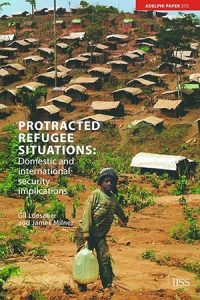Protracted Refugee Situations: Domestic and International Security Implications

Author: Gil Loescher and James Milner
Publisher: Haymarket Books
Year of Publication: 2005
Print Length: 96 pages
Genre: Non-Fiction / Migration & Refugee Studies, International Relations, Political Science
Area: Bhutan, Burundi, Kenya, Liberia, Myanmar, Nepal, Somalia, Tanzania, Thailand
People: Bhutanese Lhotshampas, Burundian, Liberian, Rohingya, Sierra Leonean, Somali
Topic: Refugees & Forced Migration, Asylum & Asylum Seekers, Internally Displaced Person (IDP), The Status of Refugees, Protracted Refugee Situations, Asylum & Refugee System, Local & Global, Security, Camps, Host Community, Refugee Host Country, Responses to Refugees, Cold War & Post-Cold War, Hostility, Threat, Rebellion, Terror & Terrorism, Social Movement, Politics & Power, International Protection, Mobility & Immobility, Refugee Management/Governance, Refugee Burden/Responsibility Sharing, Refugee Durable Solution, Refugee Local Integration, Refugee Voluntary Returns, Refugee Repatriation, Refugee Reintegration & Reconstruction, Refugee Resettlement
Protracted refugee populations not only constitute over 70% of the world’s refugees but are also a principal source of many of the irregular movements of people around the world today. The long-term presence of refugee populations in much of the developing world has come to be seen by many host states in these regions as a source of insecurity.
In response, host governments have enacted policies of containing refugees in isolated and insecure camps, have prevented the arrival of additional refugees and, in extreme cases, have engaged in forcible repatriation.
Not surprisingly, these refugee populations are also increasingly perceived as possible sources of insecurity for Western states. Refugee camps are sometimes breeding grounds for international terrorism and rebel movements. These groups often exploit the presence of refugees to engage in activities that destabilise not only host states but also entire regions.
Table of Contents
Glossary
Introduction
Political and security implications of protracted refugee situations
Framework of the paper
1. Defining the problem
Towards a working definition
Trends in protracted refugee situations
Causes of protracted refugee situations
2. Security implications of protracted refugee situations
Refugees and security during the Cold War
Security and refugees during the post-Cold War era
‘Issue-widening’ in the field of security studies
Direct threats
Indirect threats
3. Case studies: contemporary protracted refugee populations in Africa and Asia
Refugees from Somalia in Kenya
Refugees from Burundi in Tanzania
Refugees from Liberia and Sierra Leone in Guinea
Refugees from Myanmar in Thailand
The Bhutanese Lhotshampas in Nepal
4. Towards solutions for protracted refugee situations
Towards a full response: comprehensive solutions to protracted refugee situations
Enhancing the three durable solutions
Recent interest in responses to protracted refugee situations
The Somali CPA: attempt at formulating a comprehensive solution
Framework for a truly comprehensive notes
Notes

Gil Loescher (1945-2020) was an American political scientist and Visiting Professor at the Refugee Studies Centre, University of Oxford. He is a long-established expert on international refugee policy. For over 25 years, he was Professor of International Relations at the University of Notre Dame in the United States and was a visiting fellow at Princeton University, LSE, Oxford and the Department of Humanitarian Affairs at the US State Department in Washington DC. In recent years Gil has been Senior Research Fellow at the Centre for International Studies, University of Oxford, Senior Fellow for Forced Migration and International Security at the International Institute for Strategic Studies in London and a senior researcher at the European Council on Refugees and Exiles. He has served as a consultant to numerous governments, international organisations, non-governmental organisations, foundations and research institutes. Gil has been the recipient of numerous research, writing and teaching grants and has published more than 24 books and numerous journal publications.
Source: https://refugeeresearch.net/es/staff-members/gil-loescher/
More from Gil Loescher in this library, click here.

James Milner is an Associate Professor of Political Science at Carleton University. He is also currently Project Director of LERRN: The Local Engagement Refugee Research Network, a 7-year, SSHRC-funded partnership between researchers and civil society actors primarily in Canada, Jordan, Kenya, Lebanon and Tanzania. He has been a researcher, practitioner and policy advisor on issues relating to the global refugee regime, global refugee policy and the politics of asylum in the global South. In recent years, he has undertaken field research in Burundi, Guinea, Kenya, India, Tanzania and Thailand, and has presented research findings to stakeholders in New York, Geneva, London, Ottawa, Bangkok, Nairobi, Dar es Salaam and elsewhere. He has worked as a Consultant for the United Nations High Commissioner for Refugees (UNHCR) in India, Cameroon, Guinea and its Geneva Headquarters. He is author of Refugees, the State and the Politics of Asylum in Africa (Palgrave Macmillan, 2009), co-author (with Alexander Betts and Gil Loescher) of UNHCR: The Politics and Practice of Refugee Protection (Routledge, 2012), and co-editor of Refugees’ Roles in Resolving Displacement and Building Peace: Beyond Beneficiaries (Georgetown University Press, 2019) and Protracted Refugee Situations: Political, Human Rights and Security Implications (UN University Press, 2008).
Source: https://www.rsc.ox.ac.uk/people/james-milner
More from James Milner in this library, click here.
